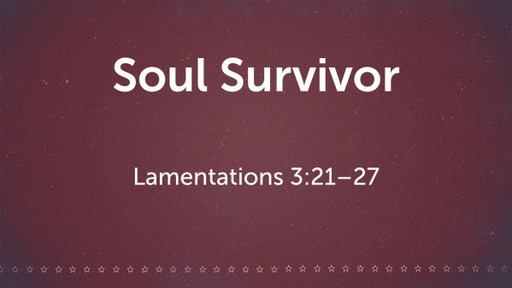Soul Survivor

Hitchhiker’s Guide To Suffering
God’s determination to bless and heal is as thorough and unusual as his determination to punish sin
Thus, Lam 3:22 agrees with one of the most extraordinary teachings in the OT. Though Israel sinned against God through idolatry, immorality, oppression, and other forms of long-term covenantal adultery to such an extent that he finally punishes severely, the Lord will still start over with penitent Israelites. In other words, God’s determination to bless and heal is as thorough and unusual as his determination to punish, if not more so. The road back to covenantal relationship may well be long and difficult, especially given the level of sin and the depth of punishment. Nonetheless, it is possible to begin.
, the word “new” does not mean “something that never existed before, but rather a fresh renewal of what has been experienced before.” Each new day the proofs of God’s grace flow from his compassionate nature (Keil, 414). Each new day dawns with the possibility of covenant renewal for a punished people. This opportunity lasts as long as God lasts since it is grounded in his personal character.
“faithfulness” expresses “a characteristic of God in relationship with a human person made manifest in his deeds. Characteristics of such fidelity are consistency, stability, truth, and permanence.” God’s covenantal fidelity and integrity remain intact no matter how things may seem. Human beings may not wish it were so, but judgment for sin as promised proves this faithfulness. Gratefully, so does God’s promise to start anew with a terribly compromised covenant partner, and it is this facet of Yahweh’s faithfulness that the speaker affirms here.
This silence, however, seems to be one of expectation. Renkema (396) argues that this silence in 3:26 “ought to be understood as more than simply sitting in a sort of paralyzed amazement. The present text speaks rather of a tenacious intensification of ‘being silent,’ of a conscious option for remaining silent.” In other words, this text transforms silence from a posture of the defeated to one of the soon-to-be delivered. Further, this silence does not preclude prayer, given 2:11–19 and 3:19–24. Thus, the silence heightens the waiting that will eventually be rewarded with “the salvation of the LORD” (לתשׁועת יהוה), though at this point the speaker does not specify what such salvation entails.